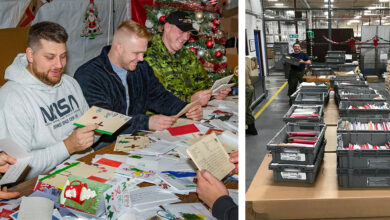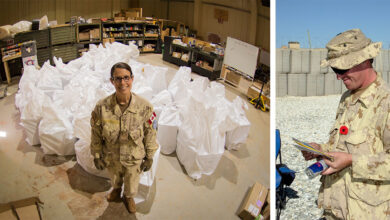Deployment TipsterWhile They're Away
5 Strategies to reconnect after time apart
 Military life requires us as family members to do a lot of coping on our own, but there are a lot of resources with ideas on how. Neighbours, family, and friends are often willing to pitch in or offer a helping hand when they know you are flying solo. This is all wonderful and truly appreciated, but I personally needed the most support when my husband came back after years of being on deployments or IR (imposed restriction, where a member is stationed away from their family).
Military life requires us as family members to do a lot of coping on our own, but there are a lot of resources with ideas on how. Neighbours, family, and friends are often willing to pitch in or offer a helping hand when they know you are flying solo. This is all wonderful and truly appreciated, but I personally needed the most support when my husband came back after years of being on deployments or IR (imposed restriction, where a member is stationed away from their family).
I have come to realize that there are a lot of things that need to be done while they are gone that make the reintegration easier. Contrary to the opinions of those who see reunion videos and think all is now well, it is actually one of the hardest times of a deployment. It is a huge readjustment to return to sharing decisions, co-parenting, thinking of their feelings as well as your own, or even sharing a bed. Losing all of the space you got used to not sharing adds to the stress of the reintegration. This is all on top of having to support them with the change from military life to home life.
Doing a few simple things during the absence will help everyone’s reintegration into family life a little easier.

1.Take Pictures
Take a few photos a day and send them so they can see minor things as well as the important events we all pull out a camera to snap a shot of. What might seem small and insignificant to you may not be for them. Sharing the little things allows them to still feel like a part of everyday life.
2. Keep Somethings Familiar
Avoid majorly rearranging furniture and other belongings whenever possible. This isn’t to say you can’t do some renovating, but make sure you also have some familiar home comforts where they have always been. It is harder to come home to the unfamiliar – you have all changed and grown, and that is hard enough to cope with. Having some familiarity helps.

3. Include Partner in Decisions
Include them in decisions as often as possible and continue to seek out their opinions. This habit can be very difficult to get back into. It is easy to get used to being the only one that makes decisions while they are gone, but it makes the integration back very difficult for everyone. Ask yourself if the decision has to be made immediately (it sometimes feels like it does, but that is rarely the case). If it doesn’t, send a text or email and get input from your absent family member too.
4. Share Information With Partner
Share important or difficult information with them even though there may not be anything they can do. Despite our best intentions (to save them stress or not add to their worries), most people would rather know the truth about what is happening while they are away than be told afterward. Ask them before they leave if you are unsure. Coming home and discovering people have kept important things from you can divide you further and trust can be broken. If you already have big things happening before they leave, take some time to talk through different scenarios.

5. Share Feeling Honestly
Talk honestly about feelings throughout the deployment. I am not suggesting you spend all your emails and phone calls complaining or crying, but it is important to be real and not sugar-coat everything. There are two reasons for this – you don’t want someone to think you are just fine without them in your lives, nor that you lied to them for months on end. While no one wants to add further stress, it is important to be real and honest with each other because before you know it, they are home and then it gets really real! Tell them about the good, the bad, and the ugly, and then end with something positive. Knowing you are hopeful about things helps them, and focusing on the good in the situation will help you too.
Deployments are hard, but reunions can be tougher. We have a lot of expectations about how much easier and wonderful it will be when they are home. It is important to remember that you have all changed and grown as people, mostly separately. Take the time you need to get to know each other again and be kind to yourself. It isn’t anyone’s fault; it is just another reality of military life.
Remember everyone struggles with reunions. We just don’t talk about it. If you are like me, I spent the deployment sharing my angst and frustrations with my nearest and dearest, so when my husband came home, I didn’t feel like I could share with him anymore. Don’t make that mistake. Yes, we are grateful they are home, but gratitude doesn’t always make it easier.










